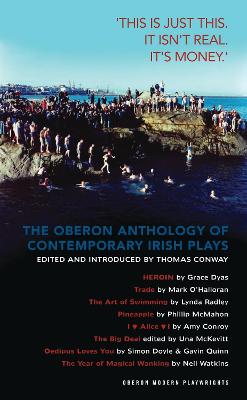Oberon Modern Playwrights
1 total work
The Oberon Anthology of Contemporary Irish Plays
by Grace Dyas, Mark O'Halloran, Lynda Radley, Phillip McMahon, Amy Conroy, Una McKevitt, Simon Doyle, Gavin Quinn, and Neil Watkins
HEROIN by Grace Dyas, Trade by Mark O’Halloran, The Art of Swimming by Lynda Radley, Pineapple by Phillip McMahon, I ? Alice ? I by Amy Conroy, The Big Deal edited by Una McKevitt, Oedipus Loves You by Simon Doyle & Gavin Quinn, The Year of Magical Wanking by Neil Watkins
Edited and introduced by Thomas Conway
This anthology comprises eight new plays by Irish playwrights premièred between the years 2006 and 2011.
These playwrights ride, however, in no slipstream of the identifiably Irish play. Here, the enterprise of playwriting itself is being re-imagined. Here, above all else, is a commitment to becoming in the theatre.
For all that, each play is concerned with what is unfinished business in Ireland. How astonishing, then, that these plays should revolve for the most part around identity and, in particular, sexual identity. How identity comes into play, how we open up the field of play, how we raise into collective experience the exercise of that play – the urgency in the playwriting would appear to lie precisely here.
We can read from the historical moment – from a narrative emphasizing an economic bubble and its hangover – into these plays. Or we can take these playwrights at their word and observe lives lived at the contour of identities in the making. It is for us as readers, just as we have as theatre-goers – frequently scandalized, enthralled, shamed, appalled, unburdened, tickled pink – to decide.
